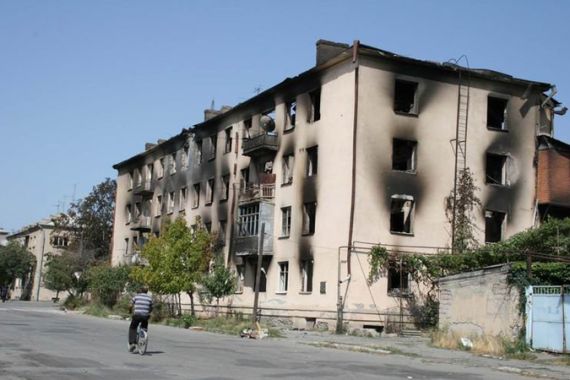South Ossetia holds polls amid slow recovery
Georgia’s breakaway region, ravaged by war in 2008, is more stable now but continues to suffer economically.

Tskhinvali, Georgia – Residents of Georgia’s breakaway region of South Ossetia are going to the polls on Sunday to vote for a new parliament.
The previous government was dismissed this January, after criticism that it has failed to improve the economy, provide social services and repair infrastructure damaged during the five-day war in 2008 fought by Georgia and Russia for control of the region.
Nine political parties are competing for 34 seats in this area of roughly 55,000 people, which split from Georgia after the breakup of the Soviet Union.
Although the Georgian-Russian war took place almost six years ago, the recovery process has been slow.
On the evening of August 7, 2008, Mikhail Saakashvili, Georgia’s former president, spoke live on television and announced a ceasefire and his support for a peace plan.
Residents of Tskhinvali, South Ossetia’s capital, thought they would have a good night’s sleep. But around midnight, Georgian government troops pulverised the town with heavy artillery fire. Tanks entered the city the very next morning.
The heaviest fighting took place in the streets of Tskhinvali between Georgian troops and so-called self-defence forces backed by Russian peacekeepers.
On August 10, Georgian forces withdrew from the South Ossetian capital in defeat.
“For the doctors the war started on August 6, when we received the first injured,” said Bestaev Ayvar, a surgeon at the main hospital in Tskhinvali. Ayvar was on duty when the war broke out.
|
|
| Russian barrier project angers Georgians |
“We were working at the emergency rooms, but when they were bombing the hospital, it wasn’t safe to stay there. We took all the injured to the basements. We have operated on more than 500 people. Most of them had severe stomach and chest wounds,” Bestaev recalled.
Kazimir Pliev, 36, was in the Russian city of Vladikavkaz, 200 kilometres north of Tskhinvali. He took the winding road through the mountains to Tskhinvali when he realised that a war was about to start. He claimed to have been a member of local “self-defence forces” at the time.
“I was in hell for two days. The whole town was on fire. I decided to go there because everyone was there: my relatives and my friends. I couldn’t stay away from that, as I was born and raised in Tskhinvali,” said Pliev. “We didn’t have any financial support from Russia. If we had it, we would be much better equipped. We were defending our town almost with bare hands, and I consider those guys who stayed there to be heroes.”
The true death toll is uncertain, with the figures varying greatly depending on the source. South Ossetia’s former leader, Eduard Kokoity, claimed that 1,400 South Ossetians had been killed in the fighting.
Sixty-four-year-old pensioner Elena Kachmanova lost two sisters during the conflict. Exploding artillery threw Diana and Zaira Kachmazovi backward and killed them.
“I was calling my girls all the time, but they stopped answering the phone on the 9th of August,” said Elena.
“There was a tank in the street that was shooting at the building. They had to be in a shelter, but they were scared and ran into another room when an artillery strike hit,” she added. She came to Tskhinvali the next day while everyone else tried to leave the war-torn town.
“I went to the morgue and found my sisters there. I used to be a happy person, but suddenly my life was broken. I am still devastated. I understand that I have to let it go, but I can’t. I will never forget that.”
Today, Tskhinvali is full of reminders of the war: from destroyed houses and rubble-strewn alleys to a continuing military presence in the streets. Dozens of homes have never been repaired.
I live in a small room with three children and have to sleep with my 12-year-old daughter ... I was promised a normal apartment, but we are still waiting.
There’s a huge hole in the wall of the apartment where Kochieva Luiza, 50, lives with her children. An artillery strike hit the building and inflicted major damage.
“I live in a small room with three children and have to sleep with my 12-year-old daughter. It’s freezing in the apartment in winter. We even don’t have a toilet inside,” Luiza said. “I was promised a normal apartment, but we are still waiting.”
Russia provided significant financial support to restore Tskhinvali, but the process of restoration is extremely slow. However, the region has seen a marked increase in stability, which many attribute to the presence of Russian peacekeeping troops. Many people feel certain that the events of 2008 will not repeat.
Alexander Pliev, the leader of the Narodnaya party, blamed what he said were incompetent government officials for the slow recovery process.
“We have enough people who are able to solve the problems we face today, and we can properly use the financial support from Russia,” said Pliev. When asked whether South Ossetia might become a part of Russia, Pliev said: “Every Ossetian dreams of that.”